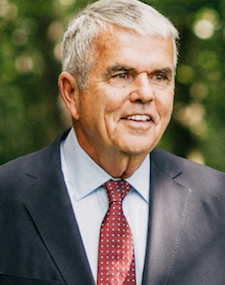By Don Keelan
In my 34 years as a Vermont resident, I don’t recall witnessing so many simultaneous crises that exist today. I experienced the controversy of Civil Unions, ACT 60 and the gold towns, the housing recession of 1989, and the Great Recession of 2008. Tropical Storm Irene and Covid-19 brought severe crises conditions to the State, and in time, we got through them by working together.

Don Keelan
Today is a different story. The media informs us that Vermont has many more crises, and we are by no means united in establishing a priority. Each particular interest group wants its cause recognized as the most important. The result is predictable: nothing gets resolved.
A list of some of the crises would include, and in no particular order: mental health, access to health care, access to child care, law enforcement reform, reform of Vermont’s incarceration system, lack of workforce housing as well as affordable housing, climate change and meeting the 2025 climate action goals, opiate deaths, lack of broadband, lack of a workforce for government, industry, the trades, retail, and health care. Add to this list the aftermath of the pandemic in our health care centers, schools, and workforce.
And outside our state’s borders are the national issues of inflation, the war in Eastern Europe, illegal immigration at the southern border, supply-chain disruption and a possible economic recession, tripling of fuel costs, and nuclear disarmament concerns with Iran, North Korea, and now Russia.
The realization is that those passionate about their (organization’s) cause are unwilling to have it placed anywhere other than at the top of the crises agenda. As such, every issue/crisis/cause is framed ‘number one.’ Where then is our leaders’ focus? Not where it should be, but to the loudest cause-seeker who has their immediate attention.
While I cannot say to any specific degree, I will state that two decades ago, Vermont did not have so many experts in health care, policing matters, incarceration issues, opiate addiction, climate change, housing, and diversity/inclusion and equity. Today we do, and they want their cause placed at the top of the “food chain.”
This is not to say that each cause is irrelevant and doesn’t require attention. What is missing is whether we can come together and decide, as a state, what we must deal with first. Isn’t this precisely what our State Motto addresses, “Freedom and Unity”?
If we are to be unified collectively, we must decide the greatest crisis confronting our State today. The lack of a workforce is decimating our government agencies, physical and mental health services, public safety, manufacturing, tourism, agriculture, retail, and volunteerism.
To address the lack of a workforce, we need to address, as a sub-group, the area of housing, childcare, and mental health. If we can return to the workforce those folks who are at home in need of child care or are now in recovery, it will make a huge dent.
We have all heard the phrase, “due to a lack of staff…,” the bank is closed, the road will be plowed, 911 will attend to you in due course, your favorite restaurant is closed, or it will be next month before we can fix your faucet. Of even more significant concern: your surgery is delayed, or we just don’t have the nurses and doctors. This is not hyperbole, but, in fact, what exists today and is becoming more acute.
If Vermont is to indeed display the motto created after Tropical Storm Irene, “Vermont Strong,” then it must cease insisting that every single cause/crisis needs to be placed at the top of the list. Let’s get back to 2011 and have the courage to prioritize what we need to do: be unified and strong, not my cause should be first.
Don Keelan writes a bi-weekly column and lives in Arlington, Vermont.



Some of your crisis issues of today don’t need a pricetag to address. Some need a band of brothers – and sisters – to step to the plate and tell local officials – racism issues are a foreign invasive species that doesn’t need to sit in our midst – remove it. Look for long term solutions not short term expensive bandaids to issues like housing homeless in hotels instead of dedicating land to be a campsite and pitching simple units. Educating youth and the rest of the community on drug issues rather than fanning interests that will stir new users with greater addiction, suicide, homeless issues in the wake.
In your list of crises, you forgot the state’s largest health care emergency, “RACISM”.
Thanks Mr. Kellan for this perceptive commentary,
I would add that perhaps it is not up to the State to solve all these crisis. It may be far more effective and appropriate to whenever possible let people solve problems themselves.
Government might best just provide assistance for those in severe circumstances who are not in a position to provide for themselves. For others its function is providing shared resources like roads and bridges, public safety, protecting our common environment from pollution, and providing opportunities for people to better themselves should they so choose.
With the exception of Tropical storm Irene, these crisis are either caused by or actively manufactured by politicians and bureaucrats.
I believe Hurricane Irene was geo-engineered; to weaken Vermont, so ‘they’ could orchestrate federal funding-related which like COVID aid always has ‘strings attached.’
Nothing would surprise me in these very strange times.
Strangely, the ‘State’ begged a company with heavy equipment to assist in Irene’s cleanup. The ‘State’ expeditiously removed the prohibitions from moving said equipment down the interstate.
When the job was completed, what do you suppose the ‘State’ response was when the company wanted to move their equipment back via the Interstate?